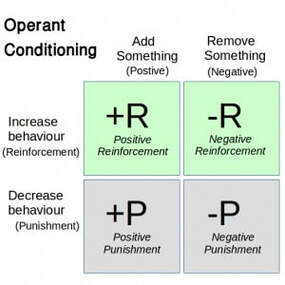
+R - giving a treat to a dog when it sits to increase the chance it will sit again
-R - removing leash pressure when your dog stops pulling to increase the chances it will stay beside you
+P - adding leash pressure when your dogs pulls
-P - withholding food when your dog jumps on you
In knowing how to increase or decrease a behaviour we are able to help a dog make decisions based on how we or the environment reacts to the action.
Classical Conditioning is a learning process and is the mechanism we use to teach or give meaning to what we are asking of our dogs. For example - the word sit means nothing to a dog when first training it but after enough repetitions of the word and then luring the dog into the behaviour the dog is able to understand that the word sit means to do this behaviour. For us, understanding how people and dogs learn is incredibly important as it helps us to better help you.
Day 2 of the seminar was all about electronic collars (e-collars). We have always been supporters of proper use of e-collars and we were excited to learn more about how to use these versatile tools. The morning was spent explaining to people new to e-collars how they work and how to introduce them properly to a dog. The afternoon was spent working different dogs and showing how to proof different situations and how the e-collar enhanced the communication and helped to eliminate stress and confusion. One of the amazing things about a good quality e-collar is the varying levels of stimulation you can provide, allowing you to find a nice low working level. A working level is the lowest level of stim you can use that they dog acknowledges. For Baron, I was easily able to hold the e-collar at the level of stim that he was working with. When used properly the e-collar becomes an extension of us and the leash. It allows us to be able to still help a dog through a situation, such as recall, when a dog is off leash. We are definitely excited to continue to use this tool in our training.
Day 3 was only a half a day but was devoted to Pack Walks and Socialization. This was our favourite day as body language was a huge part of the learning and something we find incredibly fascinating. The day consisted of doing a large pack walk and then a socialization period. It was amazing to see dogs with various behaviours be able to be off leash and interacting together in appropriate ways. A crucial component to this being possible is that time was taken throughout the weekend and the pack walk to establish a set of rules and expectations for behaviours. Another key aspect was mindset. Before going into the “soc.” it was important to have all the dogs calm, paying attention to their handlers and respecting Blake as the “referee”. We are looking forward to adding this to our offered services in the very near future.
All in all, we had an amazing time at the Acheiving Real World Obedience Seminar. We networked with some really great trainers, we refreshed topics that are crucial to our training, we learned how the e-collar can be extremely versatile, and most of all we learned how to better communicate with our dogs and client dogs.

 RSS Feed
RSS Feed
